
Lately, Minister of Information and Communications Nguyen Manh Hung said after the Prime Minister has given the green light to mobile money implementation, the Ministry has worked with the State Bank of Vietnam and telecommunication companies on goal orientation for payment services.
Presently, the state bank of Vietnam advocated for the service implementation; however it said clearly that there should be transparent regulations about parties’ responsibilities to supervise easily.
According to the Minister, Mobile Money will bring more benefits for residents who has account in telecommunication companies for paying commodities even these with trivial value.
Later when the government documents the policy implementation, the state bank and the Ministry will assess company participants and allow them to pilot it.
Minister Hung said that telecommunication companies should prepare documents to apply for new service implementation. New service will push up non cash payment in Vietnam because at present, cash payment is still popular. Specifically, 90 percent of daily transactions are conducted in cash, while the rate goes up to 99 percent for transaction worth under VND100,000 (US$4.34).
Mobile money is a form of electronic money, which allows you to do financial transactions using your mobile phone. Mobile wallets provide a safe and secure place to save our funds as they are saved virtually.
Experts said that most Vietnamese people have mobile phones whereas just 40 percent of citizens in Vietnam have bank accounts. Accordingly, telecommunication companies easily and quickly implement e-wallet nationwide.
Subsequently, early implementation of e-payment can minimize the risk of foreign peers which will dominate the market.
So far, three giant telecommunication companies including Viettel, VNPT and MobiFone have officially documented to the government about Mobile Money.
Mobile money service will provide financial services for those who has not had bank account and island residents and those who have not had access to banking services.
In a working session with Deputy Prime Minister Vuong Dinh Hue lately, VNPT General Director Pham Duc Long once again repeated the proposal of mobile money expecting that the government will allow VNPT to launch the service as early as possible.
Director Long said that MobiMoney is the general trend in the world and VNPT has prepare infrastructure and budget for implementation of e-wallet. In the present context, Mobi Money is one of new pillars in the industry revolution 4.0. He said the company will show its pivotal role in the service implementation producing huge value for the country.
At a meeting held by the Ministry, Viettel Chairman Le Dang Dung also proposed the government to give the green light to the company’s e-wallet service implementation. He said present e-payment service providers can’t keep pace with increasing demand of big city dwellers but it is empty in countryside area.
To sum up, mobile money will create opportunities for the growth of modern payment services via smartphones satisfying customers’ high demand; especially it is suitable for residents in rural districts and distant regions who can’t access to traditional banking services.
Market may keep retreating on low volumes
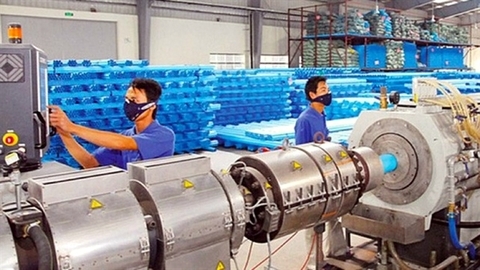
A plastic production line at Binh Minh Plastic JSC. The company, listed on the Ho Chi Minh Stock Exchange, has reported a modest gain of 5 per cent in its post-tax profits for the first quarter, which reached VND91 billion. — Photo thuonggiaoonline.vn
The market faces the risk of declining this week with extremely low liquidity, experts forecast.
The benchmark VN-Index on the Ho Chi Minh Stock Exchange (HoSE) ended last Friday at 966.21 points, recording a weekly loss of 1.69 per cent.
The minor HNX-Index on the Ha Noi Stock Exchange (HNX) fell 1.70 per cent last week to finish at 105.88 points.
Trading volume on both local bourses reached average 176.2 million shares in each session of last week.
Last Friday, indexes recovered slightly on extremely low volumes. The timely recovery helped both VN-Index and HNX-Index stay above their important resistance zones. However, signals of a reversal have not yet appeared.
Market liquidity was still on a downward trend and indices were still correcting, Vu Minh Duc, Senior Manager at Research and Analysis Department of Viet Capital Securities Company (VCSC), told tinnhanhchungkhoan.vn.
“It is likely that next week, the VN-Index will decrease, heading towards the strong resistance of around 950 points,” Duc said.
Amid the annual general meeting (AGM) season as well as the announcement of the first quarter business results of listed companies, there would be mixed results among stocks, especially blue-chips, Duc said.
According to former head of IVS Securities Co's analysis department Nguyen Huu Binh, recent low liquidity was mainly caused by poor market sentiment, especially individual investors who were not in a good mood and chose to either stay out of the market or offload their portfolios to earn profits.
The market is expected to face risks of a decrease this week. Upward sessions (if any) are forecast to be only technical rebounds, Bao Viet Securities said in its daily report.
“We leave open the possibility that the VN-Index will fall to the support zone of 940-950 points before a recovery,” it said.
This week, VN-30’s investment funds also conduct portfolio reviews for Q1, 2019. Blue-chips in VN30 basket, subsequently, may see unexpected fluctuations, the company said.
“Investors could become even more cautious and hold off on investing, especially when the long holiday is coming. The market is expected to decrease in the short run. Stock exposure, therefore, should be limited at 20-30 per cent of the portfolio,” the company said.
Investors with high stock proportions should take advantage of market’s recovery to lower stock exposure. Investors should hold off on buying new positions as the market is currently facing various risks, it added.
Last week, the declining trend dominated the market. Bottom purchasing activities were no longer happening regularly when the market appeared to decline with low liquidity.
The weakening of “Vingroup” stocks, especially two stocks of Vingroup (VIC) and Vinhomes (VHM), were the main reasons for negative movements of the market.
The decline of the large-caps in the food and beverage group also contributed to the fall of the overall market. Dairy firm Vinamilk and brewery firm Sabeco both recorded significant slumps.
Last week, the banking group struggled, while oil and gas stocks were under high correcting pressure. Vietinbank and Techcombank plunged. PetroVietnam Drilling Mud Joint Stock Corporation (PVC), PetroVietnam Transportation Corporation (PVT) and PetroVietnam Coating JSC (PVB) had corrected during the week but then recovered quite well during the last session of the week.
The optimistic point was that foreign investors were the net buyers of almost VND554 billion on the two stock exchanges. They net bought more than VND508 billion on the HoSE and VND45 billion on the HNX.
Automobile market sees strong growth in March
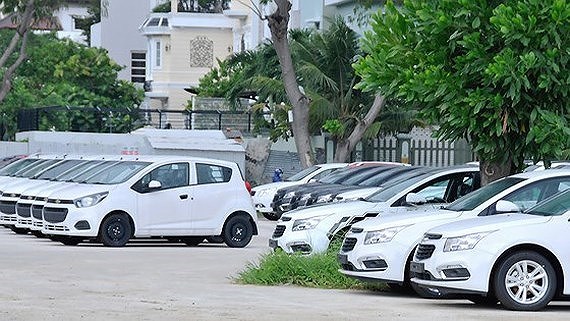
Report by the Vietnam Automobile Manufacturers’ Association (VAMA) showed that sales of passenger cars increased heavily in March, up 151 percent compared to the previous month.
There were more than 32,300 completely built unit (CBU) cars being sold in March across the country, of which more than 22,500 units were passenger cars, accounting for 70 percent.
Among 11 members of VAMA, the number of domestically-assembled cars was nearly 19,800 units, an increase of more than 157 percent over the previous month. Meanwhile, the number of CBU cars was 12,530 units, an increase of more than 164 percent over the previous month.
Since the beginning of this year, more than 56,600 passenger cars have been sold, up more than 43 percent compared to the same period last year.
According to VAMA, although domestically-assembled cars held a majority in total car consumption with 60 percent, it still saw a decline in comparison with last year with more than 46,253 units, a decrease of 3,700 units.
Meanwhile, the number of imported cars being sold was three times higher than that in the same period last year. Particularly, nearly 32,000 imported cars were sold by the end of March, up more than 22,400 units year-on-year.
Along with an increase in sales of automobiles, the automotive market also saw a reduction in prices of several car models last month.
Various activities to be held in response to World Intellectual Property Day
A wide variety of activities will be held in many provinces and cities around the country in April and May in response to the 2019 World Intellectual Property Day (IP Day – April 26).
Themed ‘Going for Gold: IP and Sports’, the 2019 IP day takes a closer view on sports, focusing on popularising and raising public awareness of the application of the Law on IP in sport business.
An event entitled ‘Community welcome the World IP Day’ will be held in Ho Chi Minh City on April 20, aiming to promote innovation, creation and IP among the community.
The final round of a contest on start-ups based on the IP rights for students will take place on May 11 in Hanoi, while a conference on state management in industrial property will be held in late April.
Students will have the chance to learn more about IP rights through joining a scientific conference on IP at the Hanoi University of Social Sciences and Humanities on April 20 and a contest themed ‘students identify, respect and protect IP rights’ in May in the central city of Hue.
The World IP Day, which was launched in 2000, has become an occasion for all people around the world to learn and encourage the IP’s contributions to the common development of countries, for innovation and people’s lives.
Hanoi targets to better its already improved business-friendliness

Fresh from being included in the top ten of Vietnam’s provincial competitiveness index (PCI) ranking for the first time in 2018 at the ninth place, Hanoi has set the target of higher rank in 2019.
.
For many, the 2018 result did not come as a surprise as the city has always been the pioneer in activities to build a government of service which supports businesses in every step.
“Hanoi’s ranking has been consistently going up in six consecutive years, up 41 places from the 51st in 2012 to the ninth in 2018,” said Nguyen Doan Toan, vice chairman of the Hanoi People’s Committee, at the 2018 PCI report launching ceremony on March 28.
For Hanoi, the recognition would serve as motivation to enhance governance capability for better business and investment environments, Toan added, referring to previous remark of Chairman of the Hanoi People’s Committee Nguyen Duc Chung that the satisfaction of enterprises and citizens has been identified as the gauge in the governance of the local government..
Recently, Hanoi has pushed forward for simplifying 61 administrative procedures under seven fields of state management, reaching the rate of 23.3% of all administrative procedures.
Moreover, Hanoi has also been the first city to implement the inter-level one-stop-shop mechanism for smooth and transparent public services.
Starting July 2017, Hanoi has waived the cost of setting up new businesses through online application and provided training courses for individual households on start-up and corporate governance, while 100% applications for business registration has now been processed online.
Notably, Hanoi has maintained the lead as Vietnam’s top foreign investment destination in the first quarter of 2019, reaching US$4.15 billion of FDI commitments, or 38.4% of the total investment inflow to the country.
As of present, Hanoi has a total of 260,379 enterprises, averaging 22,000 – 24,000 newly established enterprises per year.
Tran Ngoc Nam, deputy director of the municipal Department of Planning and Investment, said Hanoi has given priority to addressing concerns of the business community, adding the city holds monthly meeting with the attendance of Hanoi’s leaders to timely support enterprises.
According to Nam, in 2018, Hanoi has stepped up efforts in promoting dialogues between enterprises and authority at district and commune levels, which is one of the main reasons behind the capital’s high ranking in PCI 2018.
To support innovative startups and enterprises development, Hanoi has put into operation an online portal serving as a platform to connect start-ups with foreign investors.
Under Hanoi’s plan number 78 implementing measures to improve the PCI 2019 ranking with vision to 2021, Hanoi strives to have 80% of all administrative procedures processed online; maintain the business online registration rate of 100%; online tax declaration rate above 98%; custom clearance time for export below five hours and import below 21 hours.
Graded 9th in the PCI 2018 ranking with 65.40 points out of the maximum of 100, the result has exceeded original target of Hanoi being included in top 10 PCI index ranking by 2020 set by the municipal People Council.
However, there remains large room for improvement, as Vice Chairman Toan said all provinces must target a closer gap to the 100 points by 2020.
In the coming time, Hanoi would continue to reform legal framework, aiming to reduce administrative costs for enterprises and applying IT in public services.
Among the 10 PCI key indicators, Hanoi is determined to maintain its high score in training highly qualified human resources, supporting services for enterprises and transparency in management and planning.
For such efforts, Chairman of the Vietnam Chamber of Commerce and Industry (VCCI) Vu Tien Loc pointed out Hanoi is gradually realizing its potential as one of Vietnam’s economic hubs and also of the ASEAN in the future.
Support for human resources development of SMEs
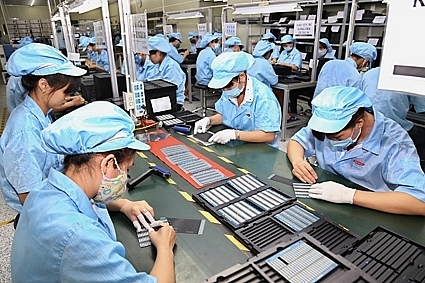
The State Bank of Viet Nam will support at least 50% of the expenditures for organizing a training course on business start-up and administration.
The Ministry of Planning and Investment has issued Circular No. 05/2019/TT-BKHĐT on support for the human resources development of small and medium-sized enterprises (SMEs).
The Circular guides training on business start-up and administration, direct training at SMEs, organization of online and mass media training courses for the SMEs and fostering a contingent of cadres, civil servants and officials on charge of supporting the SMEs.
The State budget will sponsor 100% of expenditures for students of the SMEs located at disadvantaged areas and owned by women.
Laborers and managers of the SMEs will be provided with accounts to join the online training courses on websites or smart phones.
The Circular takes effect since May 12, 2019.
Earlier PM Nguyen Xuan Phuc signed Directive No. 15/CT-TTg detailing specific steps to implement the Law on support for SMEs that took effect on January 1, 2018.
Earlier on March 8, 2018, the Government issued Decree No. 38/2018/ND-CP on investment for small-and-medium start-ups and innovative firms, which took effect on March 11, 2018.
Under the Decree, start-ups will be given support from the State budget in localities with no more than 30% of total investment mobilized from investment funds.
The maximum time for investing in a start-up is five years. After the period, State financial institutions in localities could transfer shares and contribute capital to private investors.
SMEs account for a majority (over 97%) of the total number of enterprises in the economy, playing an important role in creating jobs and income for laborers, mobilizing social resources for development investment and contributing to the state budget.
US Express delivers authentic products to Việt Nam
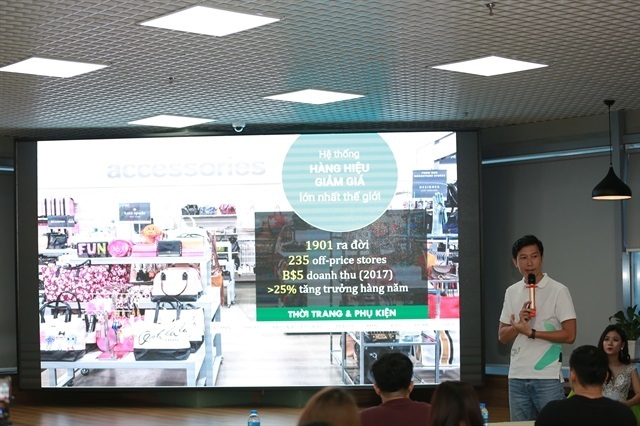
CEO Chiến Phạm talks about US Express, an e-commerce business that purchases and ships goods from the US to Việt Nam.
Products from well-known US brands like Sephora, Victoria's Secret, Lacoste, Nike, Adidas and Coach will be shipped to Vietnamese customers more quickly and conveniently than ever.
US Express, an e-commerce business specialising in purchasing and shipping goods from the US to Việt Nam, launched on Thursday in Hà Nội.
It announced a system to connect users with Nordstrom Rack and HauteLook, two of the world’s biggest sellers of discounted authentic products.
The US is the birthplace of many brands known and loved by consumers around the world, including in Việt Nam. However, prices and shipping time remain obstacles for Vietnamese consumers, with many US websites blocking access or charging membership fees, according to Chiến Phạm, CEO of US Express. He also said payment and shipping can be quite complicated when buying from overseas.
“Embracing the desire to help Vietnamese consumers purchase US goods easily from home, US Express was born to improve the cross-border e-commerce market with hi-tech solutions on an automated platform,” Phạm said. “With a few simple clicks, Vietnamese consumers can now easily buy the products they love, pay automatically and follow the shipping process through our site.”
US Express is connected with Amazon, the world’s leading player in e-commerce with more than 400 million products in different categories. It is also connected to Costco, the largest warehouse in the US that only provides services to members.
“US Express focuses on technology development and now has connected to six US e-commerce platforms already,” Phạm said. “Moreover, we have warehouses and offices and are working to become the leading cross-border e-commerce platform in Việt Nam.”
CPI under control despite petrol price hike: experts
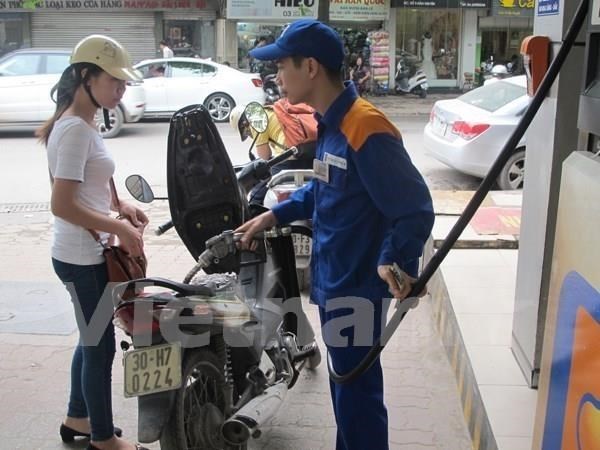
Although the petrol price has increased twice in April, adding 1,000 VND per litre in the latest adjustment on April 17, the consumer price index (CPI) is still under the control of the Government, experts have said.
According to the General Statistics Office (GSO), the petrol price hike is likely to affect the market, pushing CPI growth to 0.41 percent in April.
Nguyen Anh Quan, Director of G7 Taxi company, said the increase in fuel price had not affected taxi fares, which have stayed stable in the last 3-4 years.
The firm is considering adjusting taxi fares, he said, but confirmed that the rise will be very slight to remain competitive.
Meanwhile, Nguyen Cong Hung, Chairman of the Hanoi Taxi Association, said the association has encouraged traditional taxi companies to reduce their operations costs, keep fares stable and enhance service quality to preserve their market share.
President of the Hai Phong Road Freight Transport Association Le Van Tien said transport firms will not immediately raise their prices as they have to abide by fares stated in contracts signed with customers. Thus, transportation prices are unlikely to change greatly and will not affect CPI expansion, experts predicted.
GSO General Director Nguyen Bich Lam said in the long term, the CPI of the whole year is under the control of the Government. Functional agencies are keeping a close watch on market development, while focusing on price stabilisation and the use of the petrol price stabilisation fund, he said.
Nguyen Thi Kim Dung, Director of Co.op Mart Thanh Xuan, said that after the petrol price increase was announced, only the prices of foodstuff have increased slightly while those of other commodities were unchanged.
She revealed that some of the firm’s partners mentioned adjusting their products’ prices, but the supermarket negotiated with them to maintain current prices to protect customers.
Vu Thanh Tan, Public Relations Director of Big C, said the firm will seek ways to reduce operational costs to ensure there is no change in commodities’ prices.
Experts predicted that the CPI increase in the second quarter will be higher than the previous quarter, requiring close coordination from the Government.
Vietnam’s petrol production has met 70 percent of domestic demand, they noted, advising the country to keep adequate reserves in case of emergency.
Le Huy Khoi, head of the Department of Market Research and Forecast under the Vietnam Institute of Industrial and Trade Policy and Strategy, said that the CPI of the whole year will be under good control thanks to the experience and careful calculation of authorised agencies.
Vietnam’s tuna export to China shoots up
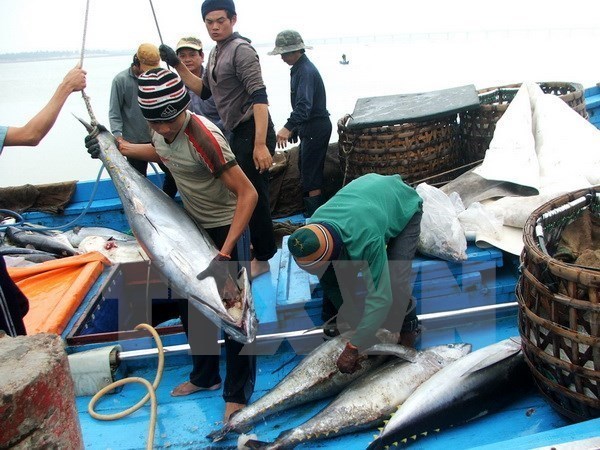
Vietnam’s export of tuna to China rocketed by 771 percent in the first two months of this year, making the market the fifth largest importer of Vietnamese tuna after the US, the EU, Israel and the ASEAN, said the Vietnam Association of Seafood Exporters and Producers (VASEP).
According to the International Trade Centre, in 2018, Vietnam was the 11th biggest tuna supplier of China, accounting for a meagre market share with 3 percent.
Particularly, frozen tuna fillets from Vietnam and the ASEAN member countries are exempted from tax in the Chinese market. The advantage allowed Vietnam to become the leading provider of frozen tuna fillets to the market with over 65 percent of the market share in 2018.
The VASEP predicted that Vietnam’s export of the product to China will continue to rise in 2019. In the first two months of this year, Vietnam’s exports to China accounted for 94 percent of the country’s total tuna export value.
The association revealed that this year, Vietnam will provide new fresh and frozen tuna products to China.
According to Nguyen Thi Thu Sac, Vice Chairwoman of VASEP, tuna exports are forecast to top 1 billion USD this year, 350 million USD higher than last year.
Enabling legal framework for cooperatives’ development needed
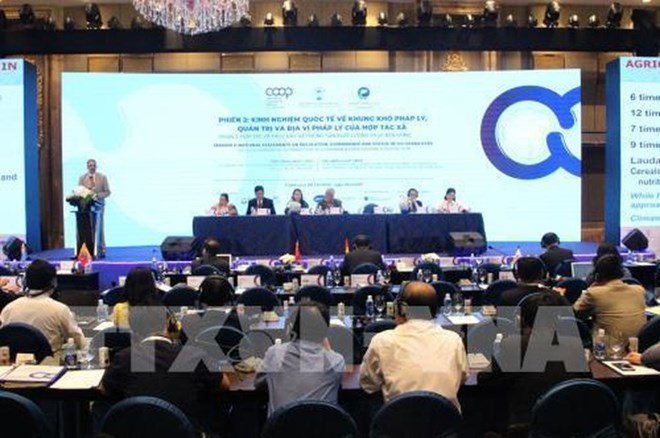
Second Asia-Pacific Cooperative Registrars’ Forum
Domestic and foreign delegates to the second Asia-Pacific Cooperative Registrars’ Forum in Ho Chi Minh City on April 18 emphasised the need to complete a legal framework to facilitate the development and effective operations of cooperatives.
Sharing Vietnam’s cooperative development situation, Director of the Vietnam Institute of Organic Agriculture Economics Le Thanh said that Vietnam now has 22,456 cooperatives, a half of which are operating effectively.
In the past three years, 2,000-2,500 new cooperatives were established each year. It is expected that Vietnam will have around 60,000 cooperatives with 20 million members by 2030, Thanh stated.
However, cooperatives are facing difficulties in gaining access to bank loans to serve agricultural restructuring, he stressed, adding that the lack of capital is also hampering cooperatives’ logistics activities.
Nguyen Manh Cuong, Vice President of the Vietnam Cooperative Alliance, underlined that an enabling legal framework would better connect domestic and foreign cooperatives, especially in hi-tech agriculture, thus helping cooperatives expand their export markets.
Ann Apps from Newcastle University of Australia and Lebbe Naseer and Commissioner of Cooperative Development & Registrar of Sri Lanka Suleiman Lebbe Naseer shared that both Australia and Sri Lanka have their own Law on Cooperatives to support the inclusive role of cooperatives in socio-economic development.
Most participants agreed that more measures should be taken to promote sustainable food production, create more jobs, and develop business in the cooperative model.
The second Asia-Pacific Cooperative Registrars’ Forum was held from April 16-19 under the theme “Creating Enabling Legal Framework and Policies to Promote Sustainable Development of Co-operatives in the 21st Century”, by the Vietnam Co-operative Alliance, the International Co-operative Alliance Asia-Pacific (ICA-AP) and the Vietnam Institute of Organic Agricultural Economics.
Construction material supply meets domestic demand
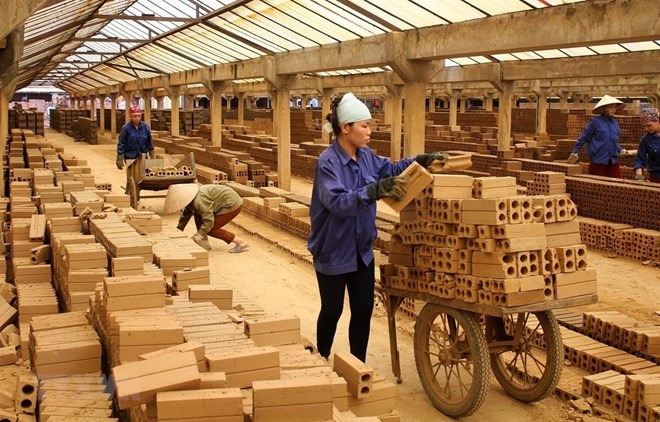
Stable production and supply-demand balance has helped Vietnam’s construction materials industry better meet domestic demand, according to the Department of Construction Materials under the Ministry of Construction.
Currently, the sector is promoting exports, focusing on protecting the environment and saving resources, said Head of the department Pham Van Bac.
Supply and demand balance in the construction material market continues to be guaranteed. Notably, about 20.7 million tonnes of cement was consumed in the first months of 2019, equivalent to the same period of 2018. Domestic consumption accounted for 12.5 million tonnes.
In recent times, the ministry has coordinated with other sectors to make timely adjustments to ensure sufficient raw materials for cement plants to operate stably and has also encouraged rational use of minerals as materials for construction projects.
Accordingly, planning of products in construction materials and problems arising in State management have been reviewed and summed up after the product planning of this field expired on December 31, 2018, thus proposing management solutions replace the plan of construction materials products when it expires under regulations of the Law on Planning.
The ministry has paid attention to several contents related to the development strategy of the cement industry by 2030 towards 2050; the construction materials development strategy in the period of 2021-2030, with a vision to 2050; the project on research and development of construction materials in service of coastal and island works to 2025; and reviewing the 10 years of implementation of the unburnt construction materials programme.
Along with urging localities to remove manual kilns and lime kilns and increase the use of unburnt building materials, the Ministry of Construction continues to implement the project of promoting the treatment and use of ash, slag, gypsum of thermal power, chemicals, and fertiliser plants as raw materials for production of construction materials and in construction projects.
One of the key tasks of the Ministry is to supplement the list of locally produced construction materials to control and limit the import of goods manufactured locally, and handle problems related to minerals used as construction materials and minerals used as cement materials.
Nghe An works to enhance ties with Japanese partners
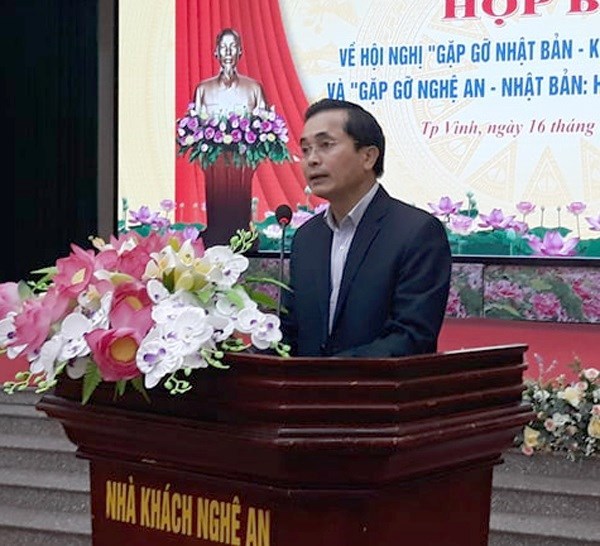
Vice Chairman of Nghe An People’s Committee Le Ngoc Hoa (Source: nongnghiep.vn)
The central province of Nghe An is taking measures to enhance its cooperation with Japanese partners, with focus on hi-tech and supporting industries, manufacturing, hi-tech agriculture, and cattle-feed production.
According to Vice Chairman of the provincial People’s Committee Le Ngoc Hoa, there are seven Japanese-funded projects totalling 72.7 million USD in Nghe An.
Furthermore, the province is implementing 44 projects using Japan’s official development assistance (ODA) with a total investment of 6.26 trillion VND (269.5 million USD).
Apart from calling for Japanese investments, Nghe An has expanded cooperation with Japanese partners in education and training, tourism, and culture. In the field of education and training, the locality selects and sends students to study at Japanese universities (471 students in 2017 and 460 in 2018). The Vinh University has cooperated with Japan’s JINNO Academy to open a Japanese language centre.
In 2015, Nghe An set up friendly relations with Gifu prefecture and is about to twin with Kochi prefecture, while its Vinh city began cooperation with Ibaraki prefecture’s Kasumigaura city, and is preparing to establish ties with Shizuoka prefecture’s Fukuroi city.
Lam Dong exports macadamia nuts to RoK, Singapore
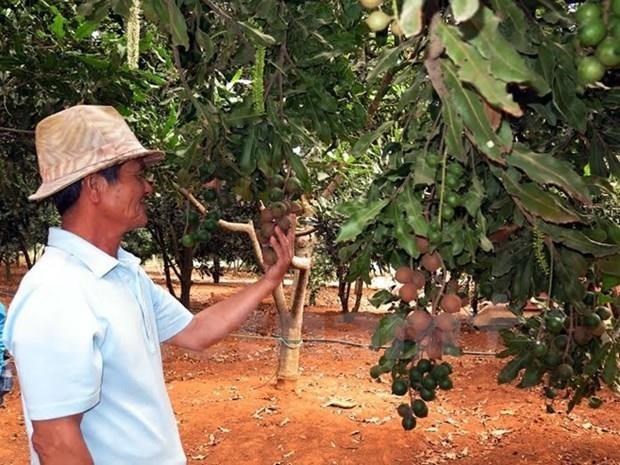
The Lam Dong-based Viet Green Maca company reported that it shipped about 10 tonnes of macadamia nuts to the Republic of Korea (RoK) and Singapore in March.
According to Director of the company Do Dinh Dung, the firm has provided to the market 25 tonnes of the nut, 40 percent of which were exported to the RoK and Singapore, and the rest to the domestic consumers.
The processed products of the company include dried macadamia and macadamia nuts, and macadamia candy, he said.
Fresh macadamia nuts are processed with advanced technology, with products’ quality meeting export standards, said Dung.
The official revealed that the company purchases material macadamia from local farmers, with about 50 tonnes of fresh macadamia collected so far this year.
Dung said that currently, the company has coordinated with about 100 local farmer households who grow about 140 hectares of macadamia. However, materials from the locality have met only 70 percent of the factory’s capacity. In the coming time, the company plans to continue expanding its partnership with more local farmers in order to have enough material for production, serving domestic and foreign markets, he added.
Petrolimex targets 26% dividend payout
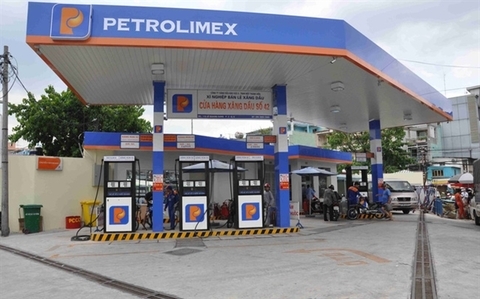
The Viet Nam National Petroleum Group (Petrolimex) will discuss a 26 per cent dividend payout rate at its annual shareholder meeting, which is scheduled for April 26. — Photo petrolimex.com.vn
The Viet Nam National Petroleum Group (Petrolimex) plans to make a 26 per cent dividend payout for its performance in 2018.
The rate will be discussed at the firm’s upcoming annual shareholder meeting on April 26 and it would be lower than 2017 dividend payout rate, which was 30 per cent.
Petrolimex is listing more than 1.29 billion shares on the Ho Chi Minh Stock Exchange (HoSE) under code PLX. The number of outstanding shares is more than 1.17 billion.
If approved, the total value of payments for 2018 would be VND3.04 trillion (US$130 million), of which the State would receive VND2.55 trillion.
Foreign investor JX Viet Nam would receive VND269 billion and the other investors would earn VND222 billion.
Petrolimex has lowered its dividend payout rate in recent years, from 32.24 per cent in 2016 to 30 per cent in 2017.
The dividend payout rate for 2019 is estimated at a minimum of 12 per cent. According to the company, 2019 is expected to be a tough year as market competition is getting fiercer.
Meanwhile, trade fraud and counterfeiting are becoming more complex and harder for authorities to fight and control.
The increasing number of private petrol retailers has also affected selling prices, cutting earnings from the retail segment.
Other problems the company will face in 2019 include volatile global oil prices and the breakdown of the Nghi Son Refinery.
VNDirect sees post-tax profit up 31% in 2019
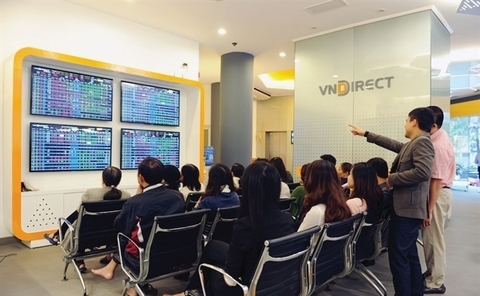
VNDirect Securities Corporation has targeted post-tax profit to increase a third to VND487 billion (US$21 million) in 2019, reflecting the firm's cautious stance for the year. — Photo nhipcaudautu.vn
VNDirect Securities Corporation (VNDS) expects its post-tax profit to grow 31 per cent year on year in 2019 to VND487 billion (US$20.9 million), attendees heard at the firm’s annual shareholder meeting on Thursday.
According to Pham Minh Huong, chairwoman of VNDS board of directors and general director, total revenue is forecast to grow one-tenth to nearly VND1.8 trillion.
In the first quarter of the year, VNDS estimated its post-tax profit was VND102 billion, equal to 21 per cent of the full-year figure.
In 2019, Viet Nam’s economic growth will slow down after having gained strongly in the previous two years, Huong told the meeting.
Total gross domestic product (GDP) growth is estimated at 6.6 per cent, which is in line with the market expectations and lower than the Government’s target of 6.8 per cent.
The Vietnamese dong will depreciate by 2 per cent this year, dragged by internal factors, while export turnover growth is forecast to decline, she added.
But the 2 per cent depreciation is considered soft, Huong said, as “pressures from international markets will ease because of a more dovish Fed approach (for interest rate hikes).”
Major challenges for the Vietnamese economy in 2019 include the runaway of foreign capital from emerging markets and risky assets on worries about geo-political disruptions and trade tensions, she added.
Meanwhile, cautious management of fiscal policy and stagnant privatisation of State-owned enterprises may worry investors about the economic growth and structure in the long run, Huong said.
Cautious earnings targets were set after the company recorded lower post-tax profit in 2018 due to the market slump since April 9, 2018.
In 2018, VNDS recorded VND1.63 trillion in total revenue, up 30 per cent year on year, and VND373 billion in post-tax profit, down 22 per cent year on year.
At the meeting, the company also planned to pay VND104.3 billion worth of dividend payout. It also wanted to issue 55.11 million shares, worth VND551.1 billion, to current shareholders to increase its capital.
VNDS also planned to sell 66 million shares in a private deal to seek potential shareholders that can provide financial and technical support for the company and increase its capital.
The company is listing 220.4 million shares on the Ho Chi Minh Stock Exchange under code VND. The company shares ended flat yesterday.
Sacombank organises seminar on metals trading on London exchange
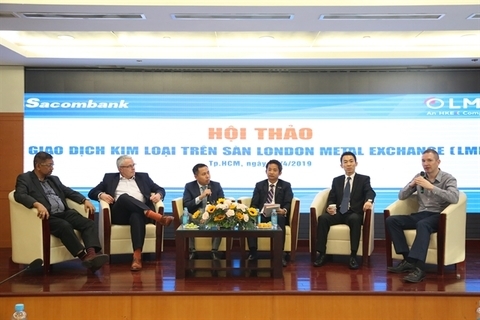
Experts answer questions from business executives at a seminar held in HCM City recently on trading on the London Metal Exchange. — Photo Courtesy of Sacombank
Sacombank and the London Metal Exchange (LME) recently organised a seminar on metals trading on the LME for customers trading metals such as aluminium, zinc, copper, lead, and tin, and having demand for commodity price insurance.
The seminar saw the participation of many prestigious companies in the fields of consulting and financial solutions such as INTL FCStone, Mitsui Bussan Commodities, Phillip Futures, and Argus.
At the event, LME experts and partners such as INTL FCStone, Mitsui Bussan Commodities, Phillip Futures, and Argus shared useful information on how to trade on the LME, introduced insurance solutions for businesses, provided up-to-date information about commodity markets and forecast future trends in commodity prices.
Sacombank also introduced to its corporate customers new technologies used in commodity future contracts from 2019 to make it easy to trade on international exchanges.
The bank plans to enable trading on mobile phones from early May, helping businesses trade easily and at any time and anywhere instead of only via the website.
The LME is the world's largest exchange for base and other metals in terms of options and futures volumes.
It offers futures and options trading in many ferrous and non-ferrous metal products such as aluminium, aluminium alloy, cobalt, copper, lead, scrap steel and China FOB hot-rolled coil (HRC) steel (Argus), North American hot rolled coil steel (Platts), and others.
It also offers other derivative tools for price risk prevention, buy/sell options and the option of physical delivery to settle contracts and its prices are used globally as reference.
State Treasury raises more than $90m via G-bonds
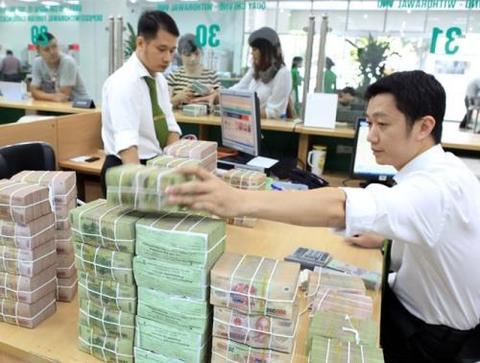
To date this year, the State Treasury has mobilised nearly VND68.72 trillion through Government bonds issued on the HNX.
The State Treasury of Viet Nam mobilised more than VND2.1trillion (US$90.17 million) through Government bond auctions on the Ha Noi Stock Exchange (HNX) on Wednesday.
Some VND3 trillion worth of G-bonds were offered, including five-year and 20-year bonds each valued at a total of VND500 billion and 10-year and 15-year bonds each valued at a total of VND1 trillion.
The State Treasury raised VND211 billion worth of 20-year bonds with an average yield rate of 5.7 per cent per year.
Bonds with 15-year term sold out at an annual interest of 5.06 per cent, the same rate offered in the previous auction on April 10.
Bonds with 10-year terms raised VND890 billion at an interest rate of 4.72 per cent, the same rate as the previous session on April 10.
The five-year bonds did not see a winning volume.
To date this year, the State Treasury has mobilised nearly VND68.72 trillion through Government bonds issued on the HNX.
VPBank officially applies Basel II
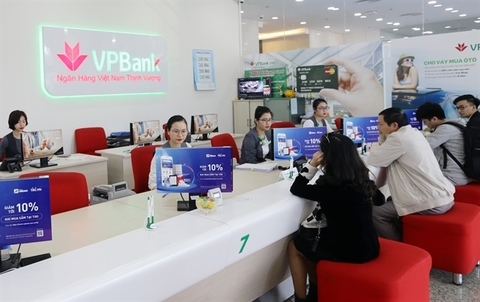
Transactions at VPBank's branch in Ha Noi. VPBank is one of the first banks in Viet Nam to meet Basel II standards.
VPBank on Wednesday was officially given approval from the State Bank of Viet Nam to apply Basel II, becoming one of the first banks in Viet Nam to meet the standards.
According to the decision, all of VPBank’s activities will start to follow Circular 41/2016-TT/NNNN from the beginning of next month.
VPBank is one of 10 commercial banks which were selected to pilot Basel II since 2014.
Meeting the capital adequacy ratio (CAR) has been a challenge for many banks when implementing Basel II. VPBank said its CAR in recent years has always been higher than the stipulated level of 8 per cent under the Basel II requirements. By the end of last year, its CAR was 11.2 per cent.
In addition, VPBank said it has achieved positive business results when implementing Basel II.
Last year, its total operating income reached more than VND31 trillion (US$1.33 billion) and pre-tax profit of VND9.2 trillion. Its return on asset (ROA) and return on equity were 2.4 per cent and 22.8 per cent, respectively.
The bank said it has focused on balancing between business targets and risk management to achieve the results. All of its units have regularly made proposals to maximise capital utility to reduce risks.
“The central bank’s approval of VPBank to follow Circular 41 would help enhance its risk management. Implementing Basel II would also promote its business administration to be more transparent, thus helping its operation be more sustainable and effective,” it said.
Basel II international standards are set out to quantify risks through indicators and models, improve risk management and strengthen market transparency. The banks meeting principles of high risk management, safe and sustainable operation will be allowed to follow Basel II.
Sacombank assists rice production, trading with loans

Sacombank enhances lending to production, purchase and consumption of rice. — Photo Courtesy of Shutterstock
As of the end of last year, outstanding loans in agricultural and rural areas around the country increased by 21.4 per cent from a year earlier, Nguyen Quoc Hung, director of the State Bank of Vietnam’s credit department, said.
The Cuu Long (Mekong) Delta accounted for 17.2 per cent of this, he told a recent conference on “Promoting rice production and consumption in the Mekong Delta”.
Outstanding loans to the rice industry alone went up by VND29.8 trillion to VND99 trillion (US$4.3 billion).
By the end of January, it reached VND100 trillion, with the delta accounting for 50 per cent, up by 0.8 per cent compared to the end of 2018.
To enhance support for rice consumption, the SBV has directed lenders to continue providing adequate credit to rice producers and traders on reasonable terms and interest rates.
Banks have pledged to cut interest rates on loans to five priority areas by half a percentage point, showing the banking sector's positivity and willingness to share the difficulties of businesses and contribute to economic growth.
Following the SBV’s direction and to assist businesses and farmers, Sacombank plans to ensure adequate funds for the production, purchase, processing, and consumption of rice at appropriate interest rates and terms, with a focus on providing loans to businesses in the Mekong Delta.
Sacombank also proactively approached businesses to offer loans and speed up disbursement to companies that purchased, temporarily stockpiled, processed, and exported rice from the winter - spring crop.
The bank is also focusing on medium- and long-term lending to enterprises to fund expansion of warehouses for rice storage and processing in the south-western region.
Since the end of March, Sacombank has participated in the World Bank’s Vietnam - Sustainable Agriculture Transformation (VnSAT) project.
One of its goals is to enable businesses to invest in the production and processing of high quality rice.
Businesses eligible to borrow under this project are private enterprises and those in the process of privatisation, and customers who trade and use raw materials sourced from eight Mekong Delta provinces: An Giang, Can Tho, Dong Thap, Hau Giang, Kien Giang, Long An, Soc Trang and Tien Giang.
The purpose of the loans is to invest in upgrading rice processing plants and equipment, including building part of or whole rice processing plants.
At the end of last year, Sacombank’s total outstanding loans topped over VND15 trillion ($647.2 million), with the south-western region accounting for more than VND8 trillion.
By offering loan packages and joining the World Bank's VnSAT project, Sacombank continues with its commitment to helping businesses and farmers promote agricultural development in general and rice production and processing in particular.
Experts discuss promoting Vietnamese trademarks

The country's top brands were honoured at the first edition of the Viet Nam Brands Forum. — Photo courtesy of the organiser
Vietnamese enterprises need good trademarks to succeed in the global market, according to Le Doan Hop, former minister of Information and Communications.
He joined other branding experts at a conference held early this week to discuss promoting Vietnamese brands to the world at the first edition of the Viet Nam Brands Forum.
The event, organised by Thuong Hieu Va Phap Luat (Brand and Law) newspaper with the support of the Ministry of Industry and Trade and the Viet Nam Association of Artisans and Trademarks, aims to celebrate Vietnamese National Trademark Day (April 20).
Hop said a good product can go out of fashion but a good trademark will live forever in the hearts of consumers.
“Vietnamese enterprises have many opportunities when many international commercial agreements are signed. With free trade agreements (FTAs), Viet Nam has a chance to export products to more than 100 countries.”
Hop stressed that the good and sustainable quality of products will help Viet Nam build a strong position in the world market.
Le Ngoc Dung, chairman of the Viet Nam Association of Artisans and Trademarks, member of the Viet Nam Fatherland Front Central Committee, said brands in cuisine and handicrafts are the strong points of Viet Nam internationally.
“Beside the tangible value (quality of the products), we can use the intangible values of the products such as origin, culture and heritage to promote them,” said Dung.
“The boom of information technology helps enterprises introduce their products however it hides many risks. For example, a brand existing for 10-20 years can face a crisis when someone posts negative opinions on social networks."
During the ceremony, the forum honoured the top 50 brands with nobility and good quality selected from 500 Vietnamese brands.
Sacombank offers certificate of deposit at 8.6 per cent interest
Sacombank is offering certificates of deposit in dong to individual and corporate customers at attractive interest rates.
The CDs have a minimum face value of VND1 million (US$43) and a tenor of seven years (84 months), and carry an interest rate of 8.6 per cent.
Buyers get incentives like preferential interest rates when borrowing using the CDs as collateral. Besides, they are transferable and can be encashed prematurely.
More information about the programme is available at www.sacombank.com, Sacombank transaction points nationwide and its hotline at 1900 5555 88.